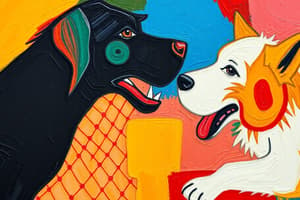Podcast
Questions and Answers
What type of response does an unconditioned stimulus produce?
What type of response does an unconditioned stimulus produce?
- Conditioned response
- Involuntary response (correct)
- Voluntary response
- Neutral response
Which of the following best describes a neutral stimulus in classical conditioning?
Which of the following best describes a neutral stimulus in classical conditioning?
- A stimulus that automatically elicits a response
- A stimulus that initially does not trigger a response (correct)
- A stimuli that is always associated with fear
- A previously conditioned stimulus
In Pavlov's experiments, which element served as the unconditioned stimulus?
In Pavlov's experiments, which element served as the unconditioned stimulus?
- The tone sound
- The conditioned stimulus
- The food (correct)
- The salivation response
What occurs when a neutral stimulus becomes a conditioned stimulus?
What occurs when a neutral stimulus becomes a conditioned stimulus?
How would a conditioned stimulus be defined after it has been associated with an unconditioned stimulus?
How would a conditioned stimulus be defined after it has been associated with an unconditioned stimulus?
Which psychological school of thought has been largely influenced by classical conditioning?
Which psychological school of thought has been largely influenced by classical conditioning?
What is the term for an automatic response to an unconditioned stimulus?
What is the term for an automatic response to an unconditioned stimulus?
What differentiates classical conditioning from other forms of learning?
What differentiates classical conditioning from other forms of learning?
In the Little Albert experiment, what eventually became the conditioned stimulus after repeated pairings?
In the Little Albert experiment, what eventually became the conditioned stimulus after repeated pairings?
What role does biological preparedness play in classical conditioning?
What role does biological preparedness play in classical conditioning?
How do conditioned taste aversions differ from typical conditioned responses?
How do conditioned taste aversions differ from typical conditioned responses?
What is a criticism of classical conditioning according to some psychologists?
What is a criticism of classical conditioning according to some psychologists?
Which of the following accurately describes operant conditioning?
Which of the following accurately describes operant conditioning?
In what scenario might classical conditioning be effectively utilized in therapy?
In what scenario might classical conditioning be effectively utilized in therapy?
What was the original neutral stimulus for Little Albert before conditioning?
What was the original neutral stimulus for Little Albert before conditioning?
How did the experiment with coyotes and sheep carcasses help ranchers?
How did the experiment with coyotes and sheep carcasses help ranchers?
Which type of memory is associated with the automatic nature of classical conditioning?
Which type of memory is associated with the automatic nature of classical conditioning?
Which of the following is an example of a conditioned response?
Which of the following is an example of a conditioned response?
What did John Watson's experiment illustrate about fear responses?
What did John Watson's experiment illustrate about fear responses?
Which of the following can be an application of classical conditioning in marketing?
Which of the following can be an application of classical conditioning in marketing?
What is one of the key differences between classical and operant conditioning?
What is one of the key differences between classical and operant conditioning?
In classical conditioning, which component is paired with an unconditioned stimulus to produce a conditioned response?
In classical conditioning, which component is paired with an unconditioned stimulus to produce a conditioned response?
What is the role of the unconditioned stimulus (UCS) in classical conditioning?
What is the role of the unconditioned stimulus (UCS) in classical conditioning?
In classical conditioning, what does the term 'acquisition' refer to?
In classical conditioning, what does the term 'acquisition' refer to?
What is the conditioned response (CR) in classical conditioning?
What is the conditioned response (CR) in classical conditioning?
Which concept describes the sudden reappearance of a conditioned response after extinction?
Which concept describes the sudden reappearance of a conditioned response after extinction?
What happens during the extinction phase of classical conditioning?
What happens during the extinction phase of classical conditioning?
Which statement best describes stimulus generalization in classical conditioning?
Which statement best describes stimulus generalization in classical conditioning?
What is the significance of a neutral stimulus in classical conditioning?
What is the significance of a neutral stimulus in classical conditioning?
In the context of classical conditioning, what does 'discrimination' refer to?
In the context of classical conditioning, what does 'discrimination' refer to?
Which of the following is an example of a naturally occurring stimulus?
Which of the following is an example of a naturally occurring stimulus?
What is a primary characteristic of the during conditioning phase in classical conditioning?
What is a primary characteristic of the during conditioning phase in classical conditioning?
Which of the following statements about conditioned responses is true?
Which of the following statements about conditioned responses is true?
What is an example of extinction in the context of classical conditioning?
What is an example of extinction in the context of classical conditioning?
In the context of the Little Albert experiment, what did stimulus generalization illustrate?
In the context of the Little Albert experiment, what did stimulus generalization illustrate?
How does reinforcement relate to the acquisition phase of classical conditioning?
How does reinforcement relate to the acquisition phase of classical conditioning?
Flashcards
Classical Conditioning
Classical Conditioning
A type of automatic learning where a neutral stimulus is associated with a naturally occurring stimulus, eventually triggering a learned response.
Unconditioned Stimulus (UCS)
Unconditioned Stimulus (UCS)
A stimulus that naturally and automatically triggers a response.
Unconditioned Response (UCR)
Unconditioned Response (UCR)
The automatic response to an unconditioned stimulus; a naturally occurring reaction.
Neutral Stimulus (NS)
Neutral Stimulus (NS)
Signup and view all the flashcards
Conditioned Stimulus (CS)
Conditioned Stimulus (CS)
Signup and view all the flashcards
Conditioned Response (CR)
Conditioned Response (CR)
Signup and view all the flashcards
Classical Conditioning
Classical Conditioning
Signup and view all the flashcards
Unconditioned Stimulus (UCS)
Unconditioned Stimulus (UCS)
Signup and view all the flashcards
Unconditioned Response (UCR)
Unconditioned Response (UCR)
Signup and view all the flashcards
Neutral Stimulus (NS)
Neutral Stimulus (NS)
Signup and view all the flashcards
Conditioned Stimulus (CS)
Conditioned Stimulus (CS)
Signup and view all the flashcards
Conditioned Response (CR)
Conditioned Response (CR)
Signup and view all the flashcards
Little Albert Experiment
Little Albert Experiment
Signup and view all the flashcards
Conditioned Taste Aversion
Conditioned Taste Aversion
Signup and view all the flashcards
Biological Preparedness
Biological Preparedness
Signup and view all the flashcards
Implicit Memory
Implicit Memory
Signup and view all the flashcards
Behavioral Therapies
Behavioral Therapies
Signup and view all the flashcards
Conditioned Response (CR)
Conditioned Response (CR)
Signup and view all the flashcards
Conditioned Stimulus (CS)
Conditioned Stimulus (CS)
Signup and view all the flashcards
Unconditioned Stimulus (UCS)
Unconditioned Stimulus (UCS)
Signup and view all the flashcards
Unconditioned Response (UCR)
Unconditioned Response (UCR)
Signup and view all the flashcards
Classical Conditioning
Classical Conditioning
Signup and view all the flashcards
Acquisition
Acquisition
Signup and view all the flashcards
Extinction
Extinction
Signup and view all the flashcards
Spontaneous Recovery
Spontaneous Recovery
Signup and view all the flashcards
Stimulus Generalization
Stimulus Generalization
Signup and view all the flashcards
Stimulus Discrimination
Stimulus Discrimination
Signup and view all the flashcards
Study Notes
Classical Conditioning
- Discovered by Ivan Pavlov, a type of unconscious/automatic learning
- Creates a conditioned response through associations between an unconditioned stimulus and a neutral stimulus
- Involves placing a neutral stimulus before a naturally occurring reflex
- Pavlov's dog experiments: neutral signal (tone), naturally occurring reflex (salivating to food)
- Sound of tone alone becomes conditioned stimulus; salivation becomes conditioned response
- Influenced behaviorism, assuming all learning is through environment interaction
- Behavior is shaped by environment
Key Terms
- Unconditioned Stimulus (UCS): Stimulus that leads to an automatic response (e.g., cold breeze causing shivering)
- Neutral Stimulus (NS): Stimulus that doesn't initially trigger a response (e.g., sound of a fan)
- Conditioned Stimulus (CS): Once neutral, now triggers a response (e.g., a dog, after being bitten)
- Unconditioned Response (UCR): Automatic response to a UCS (e.g., mouth watering to favorite food smell)
- Conditioned Response (CR): Learned response to a CS (e.g., fear of dogs after being bitten)
Classical Conditioning Phases
- Before Conditioning: UCS paired with UCR; NS introduced
- During Conditioning: Repeated pairing of NS and UCS; associations formed; NS becomes CS
- After Conditioning: CS alone triggers CR
Key Principles
- Acquisition: Initial learning of response, neutral stimulus repeatedly paired with UCS.
- Extinction: Conditioned response weakens/disappears when CS isn't paired with UCS
- Spontaneous Recovery: Reappearance of a learned response after extinction/rest period
- Stimulus Generalization: Similar stimuli evoke similar responses (e.g., fear of other white things after fear conditioning to rat)
- Stimulus Discrimination: Ability to differentiate between CS and other stimuli
- Applications and limitations of classic conditioning
Examples
- Phobias: Single pairing of neutral stimulus (dog) and frightening experience (bite) can create phobia.
- Conditioned Taste Aversions: Association between a taste (CS) and sickness (UCS) can create aversion. Rapid development potentially aids survival (biological preparedness)
- Real World Conditioning: Sheep and coyotes; marketing/advertising.
Operant Conditioning vs. Classical Conditioning
- Operant Conditioning: Voluntary actions associated with consequences (rewards/punishments)
- Classical Conditioning: Focuses on involuntary behaviors, associations to evoke responses
Criticisms of Classical Conditioning
- Some psychologists consider explanations too simple/mechanical
- People don't react exactly like Pavlov's dogs.
Applications of Classical Conditioning
- Dog training
- Treating phobias/anxiety
- Creating positive classroom environments
Studying That Suits You
Use AI to generate personalized quizzes and flashcards to suit your learning preferences.




